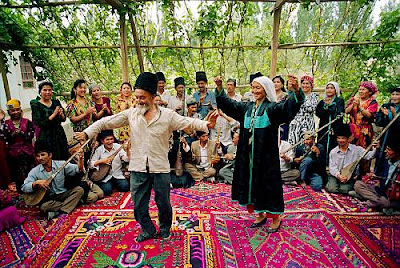Are China's Uighurs being deprived of Human Rights?
 |
| Uighurs celebrating their culture |
The Chinese government denied for a long time that the camps existed, but after images of camp construction with watch towers and barbed wired fences emerged and the situation in Xinjiang hit the headlines with reports of mass incarceration of Uighur Muslims, the government aknowledged these locations as "re-education camps". The Chinese government operating procedures guarantees that the main feature of the camps is to ensure adherence to Chinese Communist Party ideology. According to reasearches, there are an estimated on million (if not more) Uighur Muslims detained in so-called re-education camps, which are designed to strip them of their religious and ethnic identity and replace it with absolute loyalty to the state.
Who are the Uighurs?
 |
| Uighurs protest about their Human Rights being taken away |
There are around 11 million Uighurs in Xinjiang. Uighurs speak several dialects of two languages divided by territory: standard Xinjiang and standard Soviet. Standard Xinjiang is influenced by Mandarian Chinese, while the latter is spoken mostly in Kazakhstan, once part of the Soviet Union. Xinjiang has been under China's control since it was annexed in 1949, but many Uighurs still identify the region by its previous name: East Turkestan, and so, they're influenced by muslim culture and religion. For the past few decades though, there's been a mass migration of Han Chinese (China's ethnic majority) to Xinjiang, and Uighur's culture and livelihoods are under threat.
Since 2014, following attacks placed in 2013 and 2014 which extremist Uighurs militants claimed responsability for, Uighurs in Xinjiang have been affected by extensive controls and restrictions upon their religious, cultural and social life - the Chinese government has expanded police surveillance to watch for signs of "religious extremism" that include owning books about Uighurs, growing a beard, having a prayer rug or quitting smoking or drinking. It's illegal to call a newborn a name that sounds islamic, it's forbidden to visit mosques and fasting in Ramadan. The government also installed cameras in the homes of private citizens - Uighur citizens are identified and "marked", so the government keeps them under supervision. Uighurs are made to give DNA and biometric samples so Uighurs can be tracked through facial recognition cameras, and they also implemented QR codes on people's doors, so officials can check the codes to see who's inside at any point.
At any moment, an official can arrest an Uighur and take them to the camps. The arrest can be done because of the way they walk around the streets, because of Facebook posts, conversations, or even material they find on their phone - anything they believe it's not according to the regime. These arrests are immediate - there's no trial, no sense of justice, to decide the future of Uighurs.
What happens inside the "re-education camps"?
The Chinese government claims the camps in the far western Xinjiang region offer voluntary education and training, but official documents, seen by BBC Panorama, show how inmates are locked up, indoctrinated and punished. China's UK ambassador dismissed the documents as fake news.
 |
| Outside a "re-education" camp |
Sophie Richardson, the China director at Human Rights Watch, said the leaked memo should be used by prosecutors. "This is an actionable piece of evidence, documenting a gross human rights violation", she said. "I think it's fair to describe everyone being detained as being subject at least to psychological torture, because they literally don't know how long they're going to be there. The memo details how detainees will only be released when they can demonstrate they have transformed their behaviour, beliefs and language."
Ben Emmerson QC, a leading Human Rights lawyer and an adviser to the World Uighur Congress, said the camps were trying to change people's identity. "It is very difficult to view that as anything other than a mass brainwashing scheme designed and directed at an entire ethnic community. It's a total transformation that is designed specifically to wipe the Muslim Uighurs of Xinjiang as a separate cultural group off the face of the Earth."
Detainees are awarded points for their ideological transformation, study and training, and compliance with discipline, according to the memo. This punishment and reward system helps determine whether inmates are allowed to contact with their family and when they're being released - but they are only released once four Communist Party committees have seen evidence that they have been transformed.
 |
| Uighurs protest against government persecution |
Public testimonies are made by people who left camps and had to leave the country as well, sometimes leaving all their family behind. They report beating, torture, starvation as punishment, and even brainwashing exercises. These testimonies of torture have no way of being confirmed - several authorities have already directly questioned the Chinese government, but have yet to receive an answer.
Although one thing is certain: in the last couple of years, there are few records of people being released. Many families are destroyed, as they never had contact with or informations about their detained relatives and don't know if they are still in prison, if they have been released and relocated, or if they are dead.
Article written by:
Adriana Santos
Adriana Santos
Sources:https://www.dw.com/en/chinas-treatment-of-muslim-uighurs-in-xinjiang-i-had-the-chills/a-52431839
https://www.economist.com/china/2020/01/09/many-han-chinese-dont-mind-the-gulag-for-their-uighur-neighbours
https://www.bbc.com/news/world-asia-china-45474279
https://www.bbc.com/portuguese/internacional-45999030
https://www.economist.com/china/2020/01/09/many-han-chinese-dont-mind-the-gulag-for-their-uighur-neighbours
https://www.bbc.com/news/world-asia-china-45474279
https://www.bbc.com/portuguese/internacional-45999030


Comments
Post a Comment